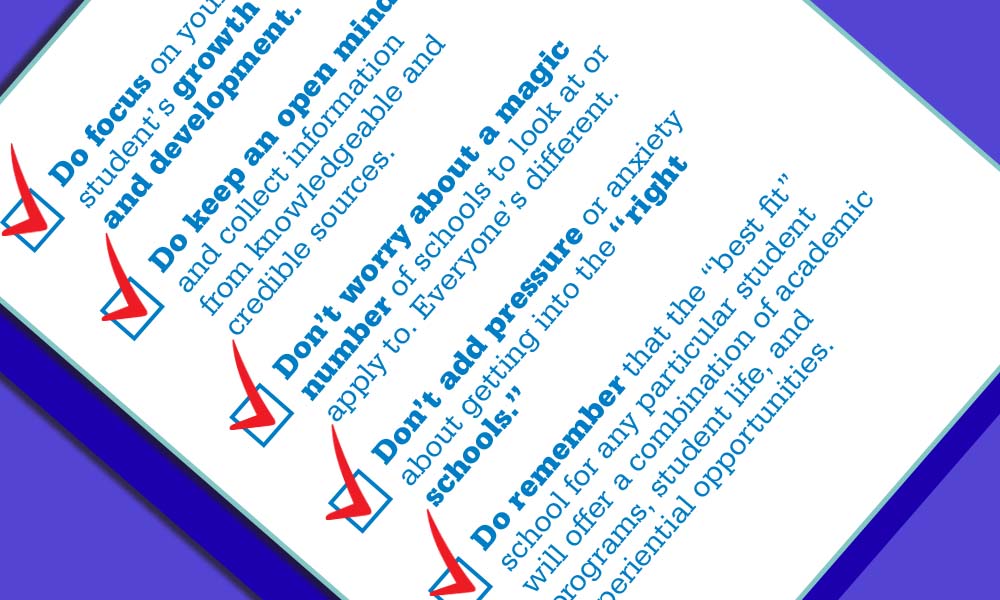How can you get into your dream college?
Odds are it’s a question that keeps many high schoolers up at night. Although there is no one-size-fits-all magic bullet on how to gain entry to your dream college — in part because there’s no one-size-fits-all dream school—we’ve culled the advice of seasoned admissions professionals from the University of Rochester for a roadmap of what to do—and what really, really (did we say really?) to avoid.
Courses and grades: It’s true. They really do matter most for getting into your dream college.
First off the bat—grades (and in many places, test scores) matter greatly when applying to your dream college. “Your academic success in high school is going to be a great predictor of your academic success in college,” confirms Kim Cragg, the University’s West Coast regional associate director of admissions. Rigor is important. Colleges want to see that you have challenged yourself and not simply collected the easy A’s. Picking enough Advanced Placement (AP) classes is important.
Extracurriculars: Avoid the “laundry list”
If your dream institution is a highly selective college, it’s safe to assume that most who apply come with a high level academic preparedness, says Jason Nevinger, the University’s director of admissions. That’s where your extracurricular activities come in.
But beware of a long laundry list. Explain how you contributed to the success or the creation of a particular association, how deeply you really got involved. Show them which opportunities you pursued to do things that are meaningful to you. “There’s no wrong club to be in,” assures Nevinger.
Above all, many admission officers want to see how a student contributes to his community, or within her school. “It is who they are as individuals, how they communicate, and how they interact with people. That really tips the scale in favor of one student over another.”
Dream college admissions essays: Make them authentic
Does the prospect of having to write a college admissions essay give you heart palpitations? You’re not alone. It’s hard to come up with something the pros haven’t read before. Focus instead on your own perspective on things, counsels Cragg.
“If you’re writing about something that you really care about, and show us your perspective—that’s going to be easier to connect with as a reader than just writing what you think we want to hear,” Cragg says.
For example, one student wrote about his daily commute to school, which involved a long car ride and detailed how he valued the time spent on meaningful conversations with his mother. Cragg was impressed by his insights.
What else do dream schools care about?
It depends on the school. That’s why you want to do your research. Every university has admissions counselors who will tell (if asked) what they value most. Many even have a section on their website titled “what we look for.”
Listen here for more tips on how to get into your dream college. University of Rochester admissions directors Jason Nevinger and Kim Cragg spill the beans with Quadcast host Sandra Knispel.
 The dos of getting into your dream college
The dos of getting into your dream college
- If campus interviews are possible—go. It’s a chance for you to see if the university is right for you and hopefully to make a good impression.
- Always ask a question (or two) of your interviewer when invited to do so. Prepare a few good ones in advance that show your knowledge of the institution.
- Be passionate about what you do, both in your essay and your interview. Colleges say they look for attributes like leadership, curiosity, eagerness for learning, and critical thinking, but also for grit, empathy, and emotional intelligence.
- The interview starts at the door. Take the lead and approach the reception counter, speak for yourself, fill out your own paperwork. (Mom and Dad, take the second row, please.)
- Be prepared to answer the question of why you are interested in a particular field of study. No canned answers.
- Do your homework. Don’t give generic answers but highlight instead what attracts you to this particular college and talk about how you would contribute to campus life. And no, don’t mention the local party scene. Instead focus on what the university offers that you plan to take advantage of. Be specific.
- Be clear in your mind why you did certain community work, what you got out of it. How do you see yourself in a larger community? Admissions officers look for signs of self-reflection and awareness vis-à-vis others.
- Dress comfortably for an interview, especially if you are taking a campus tour afterwards. But leave the worn-out jeans, baseball hats, and old sneakers at home. “You don’t have to wear a business suit, but please don’t come in sweatpants, pajamas, or yoga pants,” says an admissions pro. Do we need to explain why t-shirts that blare opinions may put you in the wrong corner?
- Grab a business card on your way out after a campus interview. Take the time for a handwritten thank-you note. It’s old school, yes, but much appreciated. It’s also rare enough to make you stand out and shine.
- Check if your dream college accepts alternative application formats such as videos (no slick production necessary), pictures, audio files, maybe even a particularly well-written AP history or English paper. It’s the latest trend but not yet widely used by applicants—hence a good way to show your authentic self.
 The don’ts for getting into your dream college
The don’ts for getting into your dream college
(And yes, these things really happened.)
- Parents—quit helicoptering. Calling the dean of admissions to talk about how gifted your child is doesn’t help. And no, don’t send a photo of your daughter even if you think that she is “drop-dead gorgeous.”
- Don’t offer a $100,000 “donation” in exchange for your child’s admission. It’s called a bribe.
- Overbearing, meddlesome, and argumentative parents who stand out when their kids come to interview are a total turnoff. We don’t want to deal with that for the next four years, admits an admission officer.
- Don’t take your shoes off and sit with your feet on the sofa immediately outside the dean’s office. First impressions count. Same goes for your handshake: a limp one is a real dud.
- Mind your language. An applicant sent an e-mail in response to some general university information, dropping the f-bomb and requesting that these e-mails that “do not pertain to me” be stopped immediately. “That was an easy no,” grins the admissions officer who was on the receiving end of the e-mails. And, while we’re on the subject, even referring in a jocular manner to a friend as “a total ass” can cost you.
- Don’t pass the buck. Resist the urge to blame your math teacher for your C in geometry.
- For heaven’s sake, get the name of the school right. “I really want to come and study at RIT,” is not a good move in an application to the University of Rochester. And “Rochester University” is not an option either.
- Don’t use a heavyweight reference who doesn’t know you. Nobody is impressed by a form letter from your senator whose aides simply scribbled your name in the blank. Your referee should know you well and be able to describe your personal qualities and your work.
- Parents—no scrapbooking. Don’t send a collation of your child’s little league participation medals, first communion certificate, and photographs from toddlerhood through high school. Seriously—this happened.
- Nobody wants to be the runner-up. Telling an admission officer that his university is the fallback, should your dream choice not work out is, well, a less than stellar move.
But maybe most importantly, don’t set your heart on just one dream college. Factors beyond your control, such as an institution’s desire for geographic, ethnic, and economic diversity, can’t (easily) be altered. Many colleges are actively looking for candidates from all 50 states, hence logically increasing chances for candidates from sparsely-populated states.
And finally, parents—be supportive if your son or daughter receives a rejection. It’s not a judgment of your child’s inherent value. But you knew that already.
Want to learn more about applying to the University of Rochester? Contact our Admissions team.
Read more
 Tips for the college-bound: Choosing high school electives
Tips for the college-bound: Choosing high school electives
Rochester’s dean of undergraduate admissions offers advice on which courses to take, and why.
 Your dream college: 20 insider tips for getting in
Your dream college: 20 insider tips for getting in
Grades. Clubs. Scores. Essays. Interviews. We’ve culled the advice of seasoned admissions professionals from the University of Rochester for a roadmap of what to do—and what to avoid.
 How to write your best college application essay
How to write your best college application essay
Rochester’s dean of undergraduate admissions Robert Alexander offers college applicants some dos and don’ts in writing the application essay.


